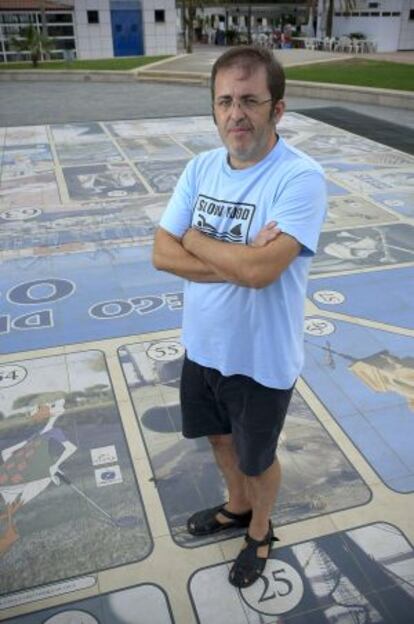Cries from the man on the street
How one angry letter sent to EL PAÍS became a 100-page tome

In 1811 Rome's ambassador in Moscow, Joseph de Maistre, wrote that "every nation has the government that it deserves." He was referring specifically to the Russian czar's empire, but the phrase has since been bandied around to describe all manner of political situations the world over. However, it is not applicable to the current Spanish government, according to Francisco Pastor.
In January the meteorologist from Castellón sent an angry letter to the editor of EL PAÍS that came to be the most-read item on the newspaper's website on that day. Pastor said he hadn't voted for the Popular Party, never bought a car that stretched his personal budget, and nor had he asked for a bank loan in order to go on an expensive vacation.
As such he didn't understand why Deputy Prime Minister Soraya Sáenz de Santamaría was asking citizens to make an "effort," nor why Valencian premier Alberto Fabra felt that Spaniards had all lived "beyond our means."
Since then, the situation has not changed. Rather, it has "gotten worse," continued the letter's author. His irritation has also grown: from the four paragraphs of that letter to the 109 pages of Siempre pagamos los mismos (or, It's always the same people who pay), published by Ediciones B. From the cuts in education and healthcare, to the freezing of pensions and the cheapening of firing, Pastor denounces the surrealism of a system where the weakest always have to pay the costs of government mistakes.
Francisco Pastor's letter to the editor became the most-read item on the newspaper's website that day
"Politicians have been discredited as a group. Those who have power should listen to what the people want," says Pastor. With cutbacks in social spending, tax increases and bailouts for banks but not regular citizens, this is not exactly what is happening. And, as such, Pastor peppers his speech with phrases such as, "I don't understand," and "how is it possible..?"
To pinpoint the main reasons behind the malaise and those responsible for this economic disaster, Pastor invites you to look at La Moncloa prime-ministerial residence, Congress, the banks and the stock market.
"It was all so nice and simple. You asked the bank for a million, and they offered you two," until the economy unraveled to leave a residue of fraud, fiscal amnesty ("we are not all the Treasury") and factories that are "dismantled to be moved to other countries with cheaper labor."
His argument is based on common sense. Quite possibly too much, as the same phrases coming out of the mouth of a politician may be deemed populist. "You have to think about who is saying what and how. I'm a man on the street."
Pastor works 38 hours a week at the Center of Mediterranean Environment Studies, and earns, in his words, "little." Judging by the success of his letter, there must be many more Spaniards like Pastor. He says he has simply taken a step forward.
"I'm not offering a world theory, neither do I want to whip up the masses. We need people to say what they think and work toward achieving [their aims]."
Tu suscripción se está usando en otro dispositivo
¿Quieres añadir otro usuario a tu suscripción?
Si continúas leyendo en este dispositivo, no se podrá leer en el otro.
FlechaTu suscripción se está usando en otro dispositivo y solo puedes acceder a EL PAÍS desde un dispositivo a la vez.
Si quieres compartir tu cuenta, cambia tu suscripción a la modalidad Premium, así podrás añadir otro usuario. Cada uno accederá con su propia cuenta de email, lo que os permitirá personalizar vuestra experiencia en EL PAÍS.
¿Tienes una suscripción de empresa? Accede aquí para contratar más cuentas.
En el caso de no saber quién está usando tu cuenta, te recomendamos cambiar tu contraseña aquí.
Si decides continuar compartiendo tu cuenta, este mensaje se mostrará en tu dispositivo y en el de la otra persona que está usando tu cuenta de forma indefinida, afectando a tu experiencia de lectura. Puedes consultar aquí los términos y condiciones de la suscripción digital.









































